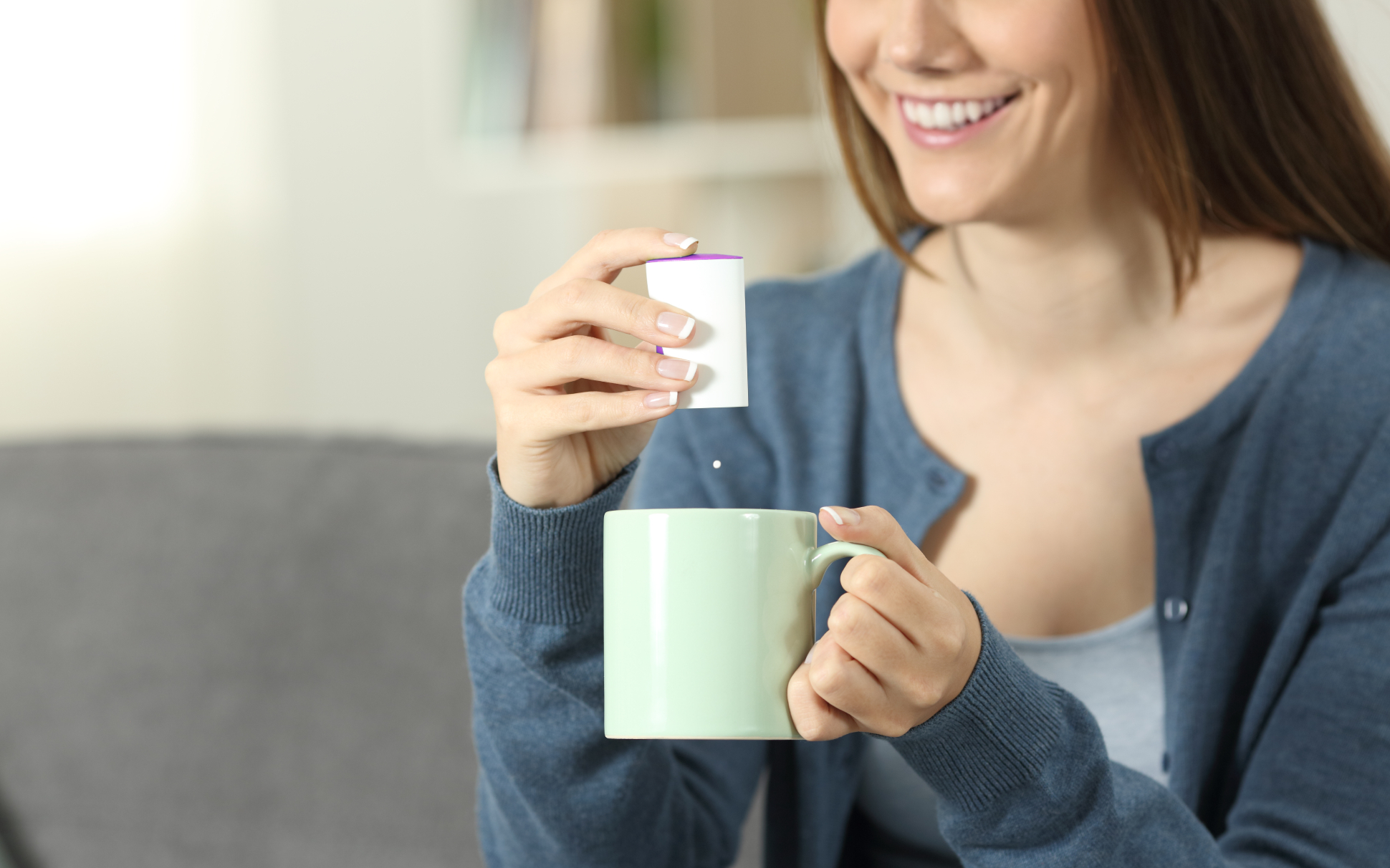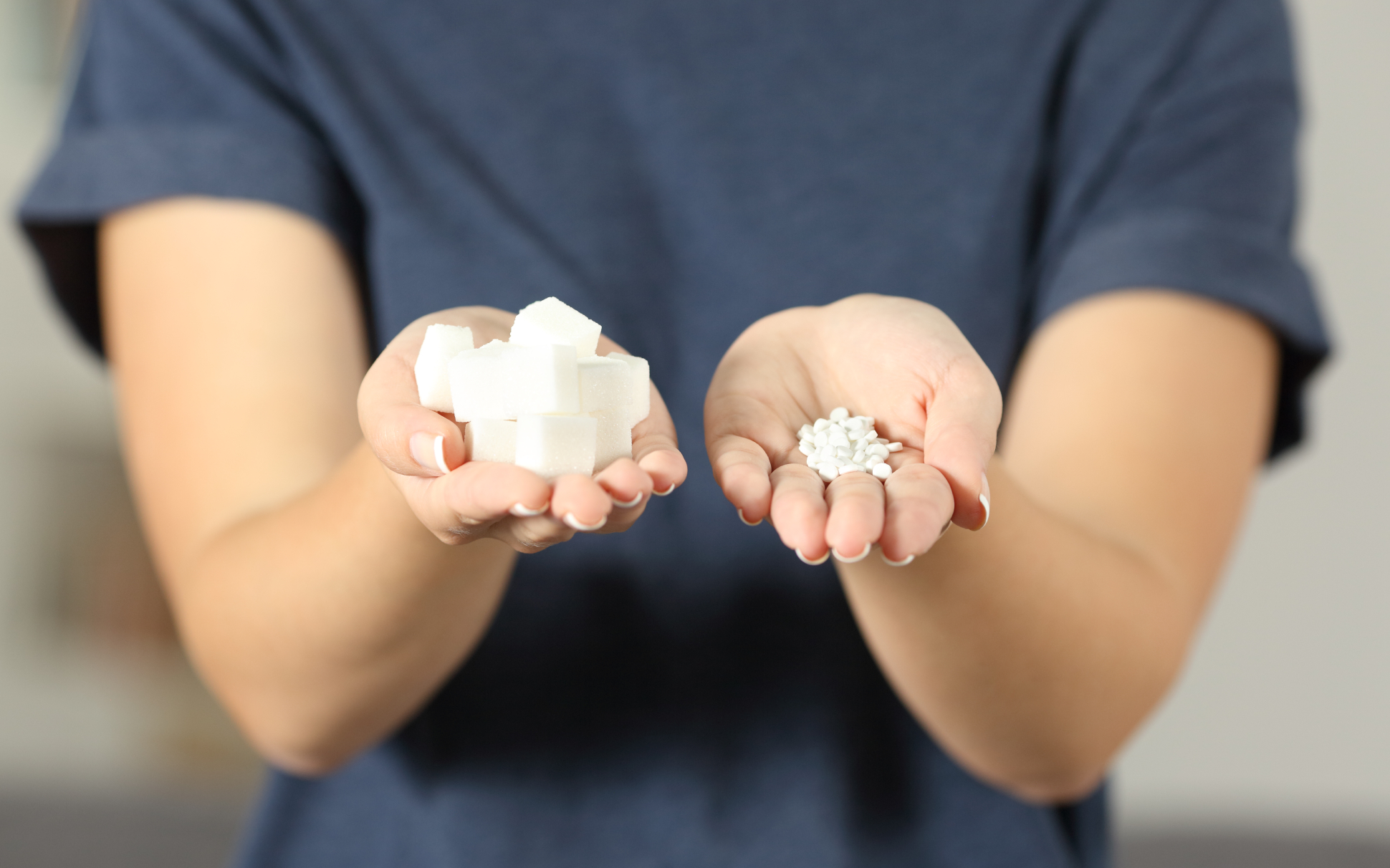Artificial sweeteners: How bad for you are they, and what can you use instead?
How many sweeteners is too many?

Whether we stir them into our tea or coffee, sip on diet drinks, or eat snacks or meals that use them as ingredients, most of us consume artificial sweeteners on a regular, if not daily, basis.
Many of us choose artificial sweeteners because of their low calorie content - there's 0 calories in a sachet of sweetener, compared with around 20 calories in a teaspoon of sugar, making them an attractive prospect if you're on a diet. It's also thought that swapping sugar for sweeteners can help to prevent tooth decay and keep blood sugar levels stable.
However, artificial sweeteners have been the topic of debate for many years, with some researchers suggesting that they can hinder your weight loss goals.
A 2017 study from the University of Manitoba showed that artificial sweeteners can actually be linked to weight gain, as well as putting you at higher risk of developing diabetes, high blood pressure and heart disease.

The scientists reviewed data from 37 studies, which analysed more than 400,000 people for an average period of 10 years.
Lead author of the study, Dr Meghan Azad told the Press Association, "The results showed a statistically significant association between consumption of artificial sweeteners and higher risks of diabetes and heart disease, as well as increased weight gain."
Although she explained that more work needs to be done to further investigate the link, Dr Azad advised that caution should be taken until 'the long-term health effects of artificial sweeteners are fully characterised.'
GoodtoKnow Newsletter
Parenting advice, hot topics, best buys and family finance tips delivered straight to your inbox.
MORE: Kick your addiction with the sugar-free diet plan - and lose up to 10lbs in 4 weeks
'Given the widespread and increasing use of artificial sweeteners, and the current epidemic of obesity and related diseases, more research is needed to determine the long-term risks and benefits of these products,' she added.
In addition to the controversy about their contribution to weight gain, there have been various health warnings about artificial sweeteners over the years, but both the European Food Safety Authority have concluded that they are safe when taken in recommended guidelines, even for children and pregnant women.
Cancer Research UK also states on their website that 'large studies in humans have provided strong evidence that artificial sweeteners do not increase the risk of cancer.'
Yet many experts do not recommend having artificial sweeteners on a regular basis. Frida Harju, nutritionist at health app Lifesum, says, "While artificial sweeteners contain less calories than other sweeteners, many also carry risks, which outweigh the benefit of their low-calorie content."
What are artificial sweeteners?
You might recognise them under brand names, such as Splenda, Canderel, or Sweetex, but artificial sweeteners come in a number of forms. On packaging, they may be referred to as acesulfame K, aspartame, saccharin, sorbitol, sucralose, or xylitol, amongst others.
They're approved for use in a range of different food and drink products in the UK, from yogurts and sauces to baked goods, and even some chewing gums and toothpastes.

How many artificial sweeteners can I have a day?
The EFSA puts sweeteners through rigorous safety checks before they can be included in products on our shelves - so there's no need to count each tablet you click, or sugar-free mint you suck.
'As part of the evaluation process, the EFSA sets an acceptable daily intake (ADI), which is the maximum amount considered safe to consume each day over the course of your lifetime,' the NHS explains.
MORE: Daily sugar allowance: How much sugar should children REALLY eat and drink?
'You don't need to keep track of how much sweetener you consume each day, as our eating habits are factored in when specifying where sweeteners can be used.'
Some sweeteners, however, can cause laxative effects if consumed in excess, so you may want to reduce your intake if you find yourself affected in this way.
What are the natural alternatives to artificial sweeteners?
If you want to cut down on your intake of artificial sweeteners, you could consider using natural sugar substitutes such as honey, maple syrup, or even fruits such as dates or banana puree, which can make excellent substitutes when you're baking. Frida also suggests agave syrup, coconut sugar and fiber syrup, which is a soluble dietary fibre and, like artificial sweeteners, is almost calorie-free.
You may also wish to begin cooking more of your family's foods from scratch rather than buying jarred or packaged products, as this gives you greater control over your consumption.
Overall then, it seems, artificial sweeteners aren't particularly bad for us at all. But, like everything, they should be consumed in moderation, with a full awareness of what you're putting in to your body.
Trusted, informative, and empathetic – GoodToKnow is the ultimate online destination for parents. At GoodtoKnow, our mission is 'simple': we're trying to make sense of parenthood. On the site, you'll find everything you need for a happy, healthy family life. Our huge archive of content includes more than 18,000 articles and 1,500 how-to videos. These include expert-backed advice features on parenting, dealing with relationship changes after having a baby, self-care for mums and managing your family finances. We also feature tried-and-tested product reviews and buying recommendations for every stage of family life - from prams and Moses baskets to birthday gifts and top toys.